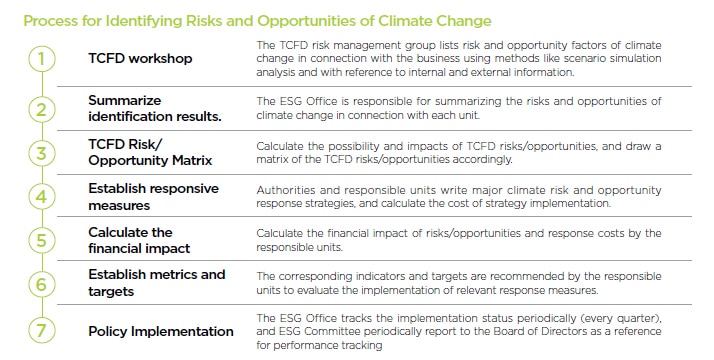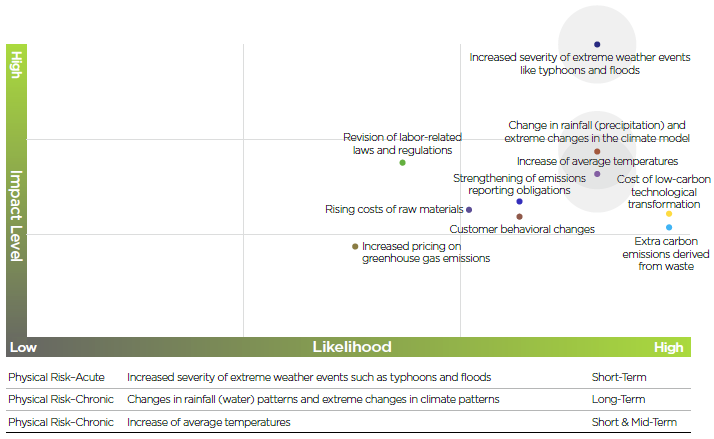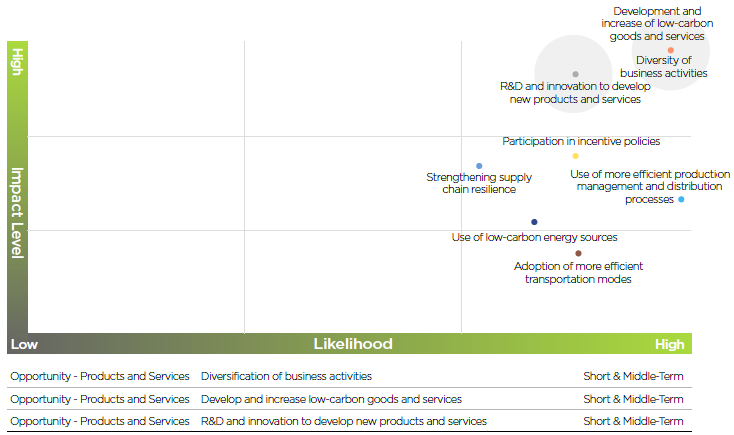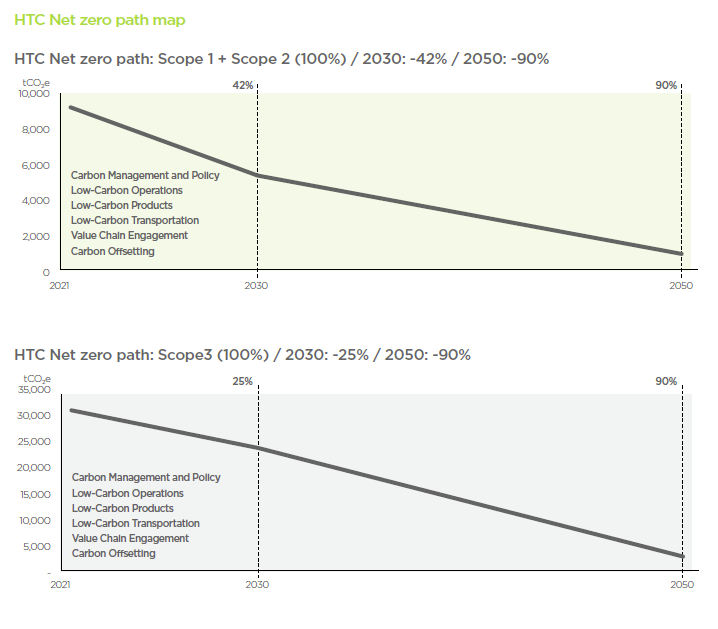Climate Change Management
HTC's expertise in mobile technology and its continuous pursuit of product innovation have enabled us to integrate climate change into our VIVE Reality vision to provide comprehensive solutions for businesses and society to create richer life experiences. In order to strengthen the company's governance of climate change and mitigate the threat posed by climate change, we have incorporated the Climate-related Financial Disclosure Framework (TCFD) into our management. The ESG Committee has designated members to form the TCFD Risk Management Team to regularly assess and identify relevant risk and opportunity factors, analyze possible future transition and physical risks and opportunities, and actively respond to relevant shocks.
We have built a risk framework based on four core elements: "Governance", "Strategy", "Risk Management", and "Metrics & Targets ". At the same time, we use the SBTi methodology to analyze, calculate and evaluate carbon emissions in a full range, formulate a net-zero carbon pathway, and formulate corresponding short-, medium- and long-term carbon reduction strategies and management indicators to meet the challenges brought about by climate change.
HTC released its first independent TCFD report in 2023 and was certified as a "Practitioner" through the SGS – TCFD Performance Assessment in 2024, it continued to publish TCFD independent reports, and was awarded the highest level of " Pioneer" in SGS.
( TCFD Report )
Governance
The Board of Directors is responsible for the final decision-making and deliberation of HTC's climate change governance and management structure. An ESG Committee is established under the Board of Directors to implement relevant topics and resolutions regarding climate change management. Led by the Chief Sustainability Officer, the ESG Committee is responsible for implementing climate
change management policies and major resolutions deliberated by the Board of Directors, integrating resources and progress of climate actions in different departments, and comprehensively evaluating climate change risks alongside other corporate risks. Several work groups have been set up under the committee to respond to ESG topics across multiple areas and collect sustainable development topics from each department to continually promote corporate social responsibility with the aim of implementing corporate sustainable management with equal consideration across the economy, environment, and society.
Relying on clear organization and labor division, relevant departments are included in the management actions in cross-departmental meetings to drive the sustainable development and innovation of HTC as a whole, and to ensure the inclusion of relevant policies and measures in daily operations of the company. Designated members of the ESG Committee have established a TCFD risk management group to participate in the projects together.
The ESG Office was set up under the committee to continually track and review the fulfillment status of each climate change related program, and to regularly review domestic and international climate governance policies and industry practices to adjust climate risk assessments accordingly. The ESG Officer reports these actions to the Board of Directors regularly, and the trends, impacts, and performance on relevant ESG topics to the ESG Committee.
Strategy
For each climate change risk and opportunity, HTC considers the impact of products or services, supply chain or value chain, climate adaptation or mitigation activities, new R&D or investment, and the type of business operation or the location of business operation facilities. Conduct impact assessment, and carry out climate "mitigation" and climate "adaptation" coping strategies for possible shocks. Based on the identified risk/opportunity items, HTC estimates the financial changes that climate change may cause to HTC, and develops various risk response strategies, evaluates and estimates "management costs" and "management benefits", based on each risk/ The short-, medium- and long-term characteristics of opportunities, and the estimated impact of climate change risks/opportunities on HTC's finances.
Risk Management
To strengthen corporate governance and enhance stable operations and sustainable development, HTC has established a Risk Management Policy for risk management based on each type of risk. It has also set up a full-time unit to implement risk management and measurement work of the company, and establish a sound risk management mechanism. The ESG Office is responsible for the management of risks related to climate change and ESG, and the overall arrangement of the TCFD risk management group to measure risk. In the risk management organization, the Board of Directors is the highest decision-making unit. The ESG Committee was established under the Board of Directors to deliberate the risk management policy, and review the management reports of material risk topics. When identifying risks, HTC conducts qualitative or quantitative management of various risks by analyzing its operating environment and covering various businesses and operating activities.

Three high-risk factors and three high-opportunity factors in HTC have been identified. The climate change risks matrix and climate change opportunities matrix are shown in the following diagram.
Climate change risk matrix

Climate change opportunity matrix

Metrics & Targets
HTC has signed a commitment with SBTi in 2022 to set the company’s net zero pathway based on its published decarbonization guidelines and methodologies, aiming to achieve net zero emissions by 2050. By linking its core business with concrete quantified management, HTC has established a clear decarbonization pathway, including six major decarbonization strategies: “carbon management and policy,” “low-carbon operations,” “low-carbon products,” “low-carbon transportation,” and “value chain engagement,” with “carbon offsetting” as a final measure. In addition, the company submitted its SBTi target review in January 2024, moving towards the 2050 net zero goal through integrated efforts. For more details on carbon reduction metrics and targets, please refer to the
TCFD Report
